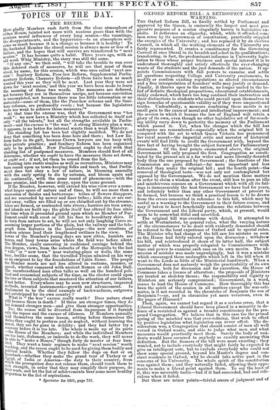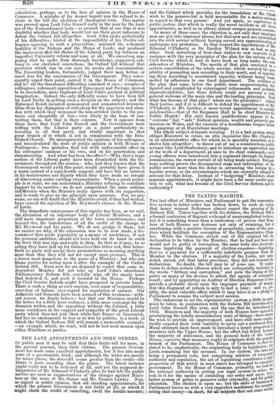OXFORD REFORM BILL : A RETROSPECT AND A WARNING.
THE Oxford Reform Bill, as finally settled by Parliament and approved by the Queen, is eminently the largest and most pro- gressive measure of a session singularly barren in legislative ex- ploits. It dethrones an oligarchy, which, while it offended. com- mon sense by its narrowness of constitution, practically crippled the energies of the University ; and has replaced it by an elective Council, in which all the working elements of the University are fairly represented. It creates a constituency for the Governing Council at once liberal in its breadth and select in its qualifications ; transferring, in fact, the predominant influence in University legis- lation to those whose proper business and special interest it is to understand thoroughly and satisfy effectively the ever-changing wants of the students and the just demands of the nation. It ap- points Commissioners with full powers to examine and settle all questions respecting College and University emoluments, to modify or confirm existing regulations as altered circumstances and a free interpretation of founders' wills may justify or demand. Finally, it throws open to the nation, no longer united in the be- lief of definite theological propositions, educational establishments, richly endowed, which have too long confined their instruction and their distinctions to students who could prevail upon themselves to sign formulas of questionable validity as if they were unquestioned truths. Undoubtedly, a measure combining these merits is no small gain to the cause of moral and intellectual improvement; and the session in which it became the law of England will retain a glory of its own, even though no other legislative act of far-reach- ing utility carry down to posterity the memory of the Parliament which passed it. Yet, when the changes which the bill has undergone are remembered—especially when the original bill is compared with the act to which Queen Victoria has pronounced her royal assent—the impartial critic and narrator of historical events will find little to credit the Government with, beyond the bare fact of having brought the subject forward for Parliamentary. discussion. Of the four points enumerated above, the original Government bill only proposed the first. Congregation as consti- tuted by the present act is a far wider and more liberally-founded body than the one proposed by Government ; the functions of the Commission are quite different—far more important and less fettered than under the original bill ; and the fourth point—the removal of theological tests—was not only not contemplated but opposed by the Government. We do not mention these matters in order to claim a wisdom after the event, still less to pass an idle and mischievous censure on a Government which with all its fail- ings is immeasurably the best Government we have had for years, and infinitely better than any other Government at present to be formed, but because we think a practical lesson is to be drawn from the errors committed in reference to this bill, which may be useful as a warning to the Government in their future course, and may if taken to heart beneficially influence the relations between the Government and the Liberal party, which, at present, would seem to be somewhat fitful and unsettled.
The original bill was overdone with detail. It attempted to settle at Westminster, by general rules, what the varying nature of the circumstances to be dealt with evidently- demanded should be referred to the local experience of Oxford and to special rules. The Minister who had charge of the bill saw his mistake as soon as the House had fairly entered upon the discussion ; withdrew his bill, and reintroduced it shorn of its latter half, the subject matter of which was properly relegated to Commissioners with time and power to examine each case on its own merits. The ad- mission of mistake was made ungrudgingly, but it was a mistake which encouraged those onslaughts which leftin the bill when it went to the Lords so little of the Ministerial handiwork. When a Government does not maturely weigh the practicability of its own enactments, both for discussion and for execution, the House of Commons Les a licence of alteration ; the proposals of Jinisters are treated as skeleton theses; the responsibility and dignity or Ministers are seriously compromised ; Government, in a word, ceases to lead the House of Commons. How thoroughly this has been the spirit of the session in all matters except the war-esti- mates, is it not recorded in the chronicles of Benjamin the son of Benjamin P—ay, and in chronicles yet more veracious, even in the pages of Hansard? Then, again, we cannot but regard it as a serious error, that a Liberal Government should have been placed in a minority, in de- fence of a restricted as against a broader constituency for the pro- posed Congregation. We believe that in this case too the primal spring of the mischief was that over-refining, that wish to effect by positive legislation what legislation can never effect. The de- sideratum was a Congregation that should consist of men all well versed in Oxford wants, and able to judge what men and what measures would practically meet them. Surely the body of resi- dents would have occurred to anybody as exactly answering this definition. But the framers of the bill were more exacting : they wanted, not to include everybody that might fairly be expected to give an intelligent vote, but to exclude everybody who could not show some special ground, beyond his Master's degree and con- stant residence in Oxford, why he should take active part in the concerns of his University. The whole spirit of the constitution was against them ; and they naturally failed, allowing their oppo- nents to make a liberal point against them. To say the least of it, this was miserable tactic—bad if it had succeeded, bad and ridi- culous when it failed.
But these are minor points—trivial errors of judgment and of calculation, perhaps, as to the bias of opinion in the House of Commons. A mistake of far deeper import was the refusal to in- clude in the bill the abolition of theological tests. This matter was pressed upon Lord John Russell early in the year by the lead- ers of the Nonconformist body—so pressed that at one time it was • doubtful whether that body would not use their great influence to defeat the Oxford bill altogether. Lord John spoke pathetically of his difficulties; hinted at the impossibility of his Peelite col- leagues agreeing to such a proposition ; assumed the vehement hostility of the Bishops and the House of Lords ; and produced the impression that the choice of the Liberal party lay between an imperfect University reform and none at all. We ourselves, sup- posing that he spoke from thorough knowledge, supported, con- trary to our cherished convictions, the Oxford bill without that provision which was in our eyes its crown and consummation. The Dissenting leaders, fortunately, judged their man better, or cared less for the convenience of the Government. They conse- quently urged their point, carried it in the House of Commons, and lo! all the threatened difficulties vanished at once ; scruples of colleagues, vehement opposition of Episcopacy and Peerage, proved to be moonshine, mere bugbears of Lord John's poetical or political imagination. Indeed, the only difficulty seems to have been felt by Lord Derby in getting even a division on the subject; and the Episcopal Bench incurred unmeasured and unmannered denuncia- tions from lay champions of orthodoxy for the eagerness and aban- don with which they welcomed the non-articled clerks to the pas- tures and sheepfolds of Isis—very likely in the hope of con- verting them, but that is their concern. Now it appears from these facts, that Lord John Russell and the Government were trifling with the Liberal party on a point particularly in- teresting to all that party, and vitally important to that great branch of it which is not in communion with the Esta- blished Church. He misrepresented the opinions of his colleagues, and miscalculated the state of public opinion in both Houses of Parliament ; two mistakes that tell with unfavourable effect on his colleagues' candour or his own, and on his penetration and statesmanship. And what has been the effect P—Why, that a large section of the Liberal party have been dissatisfied with the Go- vernment throughout the session ; who, had they known that the Government would yield this point, would probably have given it a warm instead of a semi-hostile support, and have felt an interest in its maintenance and dignity which they have made no scruple of disavowing under existing circumstances. When a great princi- ple is at stake, we can understand a Ministry refusing to conciliate support by its sacrifice • we do not comprehend the same sublime indifference when the idinistry really agrees with its supporters, and is ready to give up the principle upon pressure. For, we pre- sume, no one will doubt that the Ministers could, if they had wished, have caused the rejection of Mr. Heywood's clauses in the House of Lords.
The immediate consequence of this caprice has been, as we said, the alienation of an important body of Liberal Members, and a still more important proportion of the town constituencies ; and beyond this, the transference of all the credit of the change to Mr. Heywood and his party. We do not grudge it them ; but we cannot see why, if the concession was to be now made, a Go- vernment that needs popularity as a means of usefulness, if not for personal ambition, should not have held out its hand to catch the fruit that was ripe and ready to drop. Be that as it may, by so acting they have laid up for themselves this bitter rod, that hence- forth no party will accept their protestations as meaning anything more than that they will not act except upon pressure. This is a lesson most dangerous to the peace of a Ministry ; but who can blame parties for acting upon it after the example of the Oxford Reform Bill. Even now we are disposed to regret that some in- dependent Member did not take up Lord John's abandoned Parliamentary Reform Bill, carefully wipe off the manly tears that bedewed it, and push it forward in the House. Perhaps the Civil Service Reform might have prospered in private hands. There is such a thing as over-caution, over-sense of responsibility, over-fear of failure, over-regard for reputation of success. Our Admirals and Generals have been accused of this weakness—with- out reason, we firmly believe ; but that our Ministers would be the better for a little more rashness, a little more contempt for the disunion within and the opposition without the Cabinet, a little more confidence in the support and sympathy of the great Liberal party which does not join their white-bait dinner at Greenwich, and has no emoluments to lose or to win by politics, is a truth of which the Oxford Reform Bill will remain a memorable example, —an example which, we trust, will not be lost next session upon either Ministers or parties.



























 Previous page
Previous page